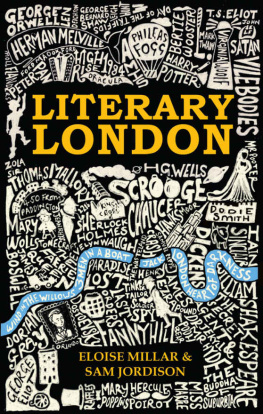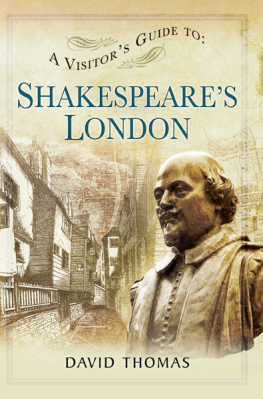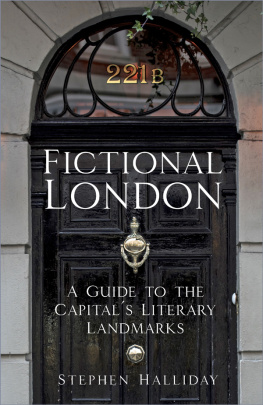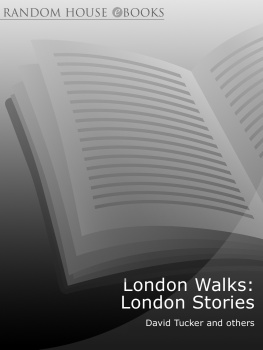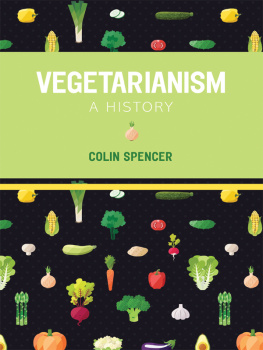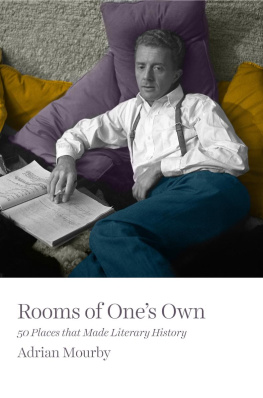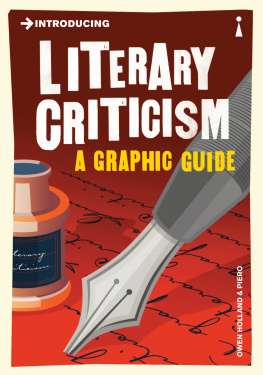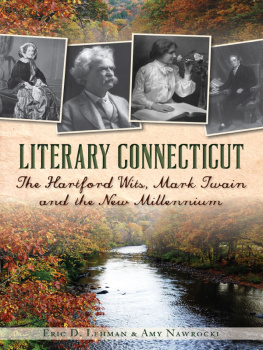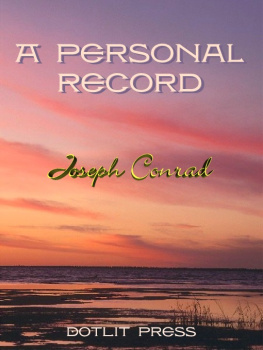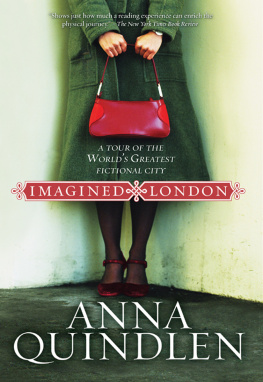
To Polly
First published in Great Britain in 2016 by
Michael OMara Books Limited
9 Lion Yard
Tremadoc Road
London SW4 7NQ
Copyright Eloise Millar and Sam Jordison 2016
All rights reserved. You may not copy, store, distribute, transmit, reproduce or otherwise make available this publication (or any part of it) in any form, or by any means (electronic, digital, optical, mechanical, photocopying, recording or otherwise), without the prior written permission of the publisher. Any person who does any unauthorized act in relation to this publication may be liable to criminal prosecution and civil claims for damages.
A CIP catalogue record for this book is available from the British Library.
ISBN: 978-1-78243-504-4 in hardback print format
ISBN: 978-1-78243-505-1 e-book format
Cover design and inside illustrations by James Nunn
www.mombooks.com
CONTENTS
L ondon is one of the worlds greatest literary cities. Its streets are full of stories. Its buildings are steeped in history. Its pubs and clubs are full of writers and more often than not, are also haunted by their creations.
William Shakespeare, John Milton, Lord Byron, Charles Dickens, Virginia Woolf, Doris Lessing... Sherlock Holmes, George Smiley, Sir John Falstaff, Paddington Bear. The biggest and most beloved names in English literature have all been here. You can still see many of their stomping grounds. And this is the book that will tell you how to find them.
As well as explaining where to find the best literary landmarks in London, we aim to tell the stories behind the stories, the moments of inspiration, the formation of friendships and also the feuds, spats, quarrels and debauches that have always characterized both London and the writing life. We follow Oscar Wilde from his triumph in the citys high-society salons to his humiliation in convict dress and handcuffed on the platform at Clapham Junction. We roam with Julian MacLaren-Ross through Fitzrovia, and drop in for a pint or three with Dylan Thomas at the Bricklayers Arms. We muse darkly over the Thames with Edmund Spenser, T. S. Eliot, Joseph Conrad... We see Byron terrorizing his publisher in Albemarle Street and look on with even greater horror as the same publisher burns the poets scandalous journals a few years later, on hearing of his death...
There are endless tales to tell. Its hard to exaggerate the importance of London as the source, inspiration and theme of much of our finest literature, harder still to imagine how the world of English letters would look without the capital city. After all, its easy to argue that all literature in English flows directly from the moment Chaucer took up his quill and began to compose The Canterbury Tales in Londons Aldgate, towards the end of the fourteenth century.
To include every moment in London literary history since then would be impossible. This is by its nature a partial, personal and subjective guide. It may even be eccentric although we hope that may add to the appeal.
We dont pretend to be comprehensive, but we do aim to be entertaining. Our goal has been to be interesting rather than encyclopedic. Rather than list every street name and road junction, book and poem and person, weve simply included the stories that seem to us the most enlightening and amusing.
We have included plenty of useful addresses too, and there are notes and maps that will provide many days of pleasurable exploring and the heady pleasure of walking the same streets as so many famous writers and characters. Our hope is that you can enjoy the book from beginning to end as a story of the teeming life and inspirational power of this city but also that you can dip in and out, and use this book to inspire a few good jaunts of your own.
Literary London moves through time and genre, from Edmund Spenser and William Shakespeare to Neil Gaiman and Will Self, from Romantics and diarists to modernists and science fiction futurists. If you read from beginning to end, youll have a good overview of London from its distant past as a lonely swampland... to its future as pretty much the same thing, if you believe the predictions of many of Londons post-apocalyptic authors. Even so, chapters are only loosely chronological, since its often more fun to group stories by theme rather than by year. We dont aim to be exhaustive. We just try to show why anyone who is tired of London is also as one writer so famously put it tired of life.
Eloise Millar and Sam Jordison
L ondon began in swamp an empty plain near a wide winding river, surrounded by low hills and not much else. We dont know when the first houses arrived there, but we do know it was a long time ago. In 2010 the remains of a large timber building dating back to 4500 BC were found in the Thames mud, near the present site of Vauxhall Bridge, so we can assume there have been people in the London area for at least 6,000 years, although things remain murky until AD 100, when the settlement became the capital of Roman Britannia. Even after that there were many dark years. Theres sparse information about Roman London, and even less about what happened after the collapse of Roman rule, when its thought that the city was abandoned. The next good lead comes in the ninth-century Anglo-Saxon Chronicle, which says that the city was refounded by Alfred the Great in AD 886.
Alfred was usefully occupied not just in burning cakes, but also in building and fortifying the wall, developing a new street plan, and acting as an early literary patron who summoned religious scholars to translate some of the great Latin works into Old English. Still, the products of any wider literary scene were either sparse, or have been lost in the mists of time.
Things come into sharper focus in the medieval period. Yet even then, most early mentions arise in passing. Quite literally so in the case of Richard of Devizes, a monk from Winchester who walked through the city sometime in the late twelfth century. He didnt recommend that others should follow. You will come to London, he wrote. Behold! I warn you, whatever of evil or of perversity there is in any, whatever in all parts of the world, you will find in that city alone. He next provided a long list of all the fun to be had in the area, with its effeminate sodomites and lewd musical girls. Less amusingly, he also became the first person to use the word holocaust in reference to a massacre of the citys Jewish population.
In the same century, William Langland (c.133286) grew up and became a loller and idler in the Cornhill area of London. But nothing is certain about his life, since all the information we have comes from the text of his own Piers Plowman a poem where reality is never certain and real life elides with dreams, allegory and mystical Christian quests. This visionary work is thought to have been written in the years between 1370 and 1390, making it contemporary with another great Middle English poem and the one that is credited with changing and shaping the English language for ever: The Canterbury Tales.
It was in London, in the final years of the fourteenth century, that Geoffrey Chaucer (c.13431400) produced his long series of stories recounted by pilgrims on their way to Canterbury. Crucially, instead of writing in French or Latin, the dominant literary languages of the time, he chose to compose his verses in a Middle English vernacular one based on his own London dialect and so helped set the template for everything that followed.
Next page
